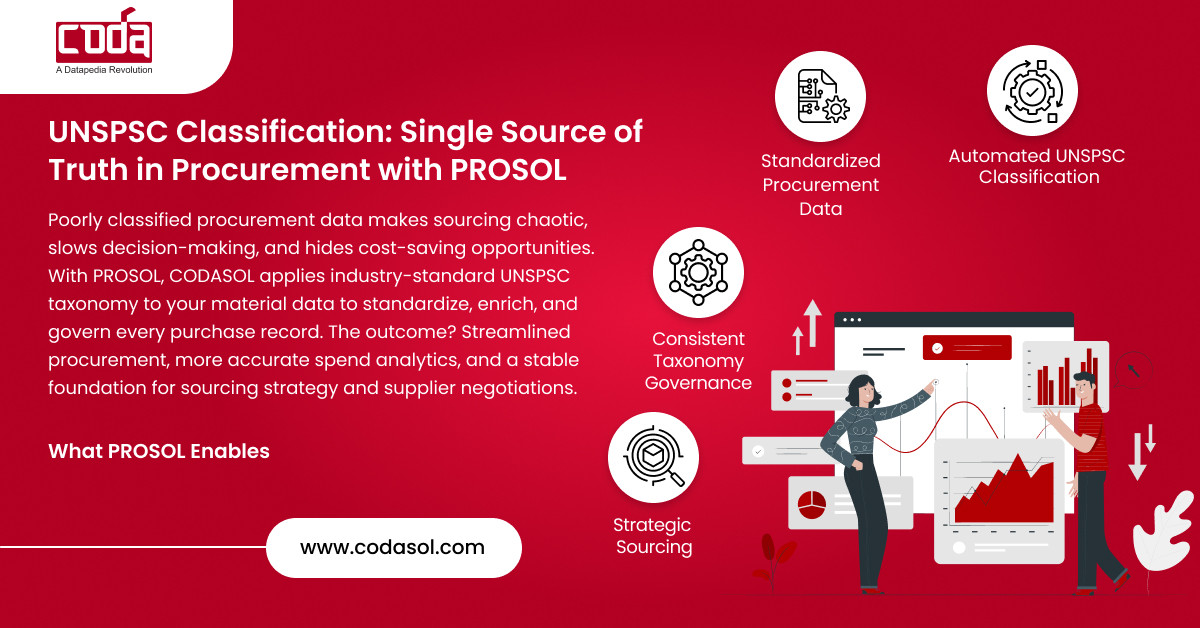UNSPSC Classification: Single Source of Truth in Procurement
Procurement teams often struggle with inconsistent item data and duplicate entries across ERP systems. The solution lies in UNSPSC classification, a global standard that organizes products and services under a unified coding structure.
By applying UNSPSC classification, organizations gain data consistency, better spend visibility, and improved supplier management. When powered by Prosol, CODASOL’s AI-driven MDM platform, it builds a single source of truth in procurement, enabling accurate reporting, efficient sourcing, and smarter decision-making.
What Is UNSPSC Classification
UNSPSC (United Nations Standard Products and Services Code) is a global taxonomy that classifies all products and services using a structured, hierarchical system. It creates a common language across procurement, supply chain, and finance functions, making data consistent across regions, suppliers, and ERPs.
Here’s how the structure looks:
| Level | Description | Example |
|---|---|---|
| Segment | Broad industry group | 27 – Tools and General Machinery |
| Family | Group of related products | 27-15 – Industrial Tools |
| Class | Narrower product grouping | 27-15-01 – Hand Tools |
| Commodity | Specific item type | 27-15-01-02 – Wrenches |
Why Does It Matter
- Global standardization: Adopted by governments, Fortune 500 companies, and ERPs worldwide.
- Cross-system interoperability: Ensures seamless data exchange between SAP, Oracle, and other procurement platforms.
- Accurate spend analysis enables granular spend categorization for strategic sourcing.
- Simplified vendor management: Classifies suppliers based on the goods or services they provide.
When applied consistently, UNSPSC classification transforms procurement data into a strategic asset.
Why Classification Alone Doesn’t Solve Procurement Data Problems
Many enterprises attempt to “apply UNSPSC codes” once and move on, only to realize that half their data is still inconsistent. Common challenges include:
- Duplicate item descriptions across plants.
- Misclassified materials and services.
- Partial UNSPSC mapping.
- Lack of synchronization between ERP, CMMS, and supplier systems.
The outcome is predictable: unreliable analytics, wasted sourcing time, and uncontrolled maverick spend.
To truly create a single source of truth, UNSPSC Classification must be embedded into a governed, automated data platform, not just applied as a one-time fix.
That’s where PROSOL changes the game.
How PROSOL Turns UNSPSC Classification into a Single Source of Truth
PROSOL, developed by CODASOL, is an AI/ML-powered Master Data Management platform built for asset-intensive industries. It doesn’t just classify data, it cleanses, enriches, and governs it across the enterprise.
Here’s how PROSOL transforms UNSPSC Classification into measurable business outcomes:
1. Automated Data Cleansing & Enrichment
PROSOL scans item master records to identify duplicates, incomplete descriptions, and anomalies. It then enriches each entry using UNSPSC standards, ensuring every item is validated, complete, and correctly coded.
2. AI-Driven Auto-Classification
Using machine learning, PROSOL automatically maps items and services to the right UNSPSC codes. This reduces manual effort, improves accuracy, and ensures consistency across departments and ERPs.
3. Seamless ERP Integration
PROSOL integrates directly with major ERPs such as SAP, Oracle, and IBM Maximo, enabling real-time synchronization of classified data.
4. Continuous Data Governance
It isn’t a one-time cleanup. PROSOL establishes workflows, validation rules, and audit trails, making UNSPSC classification a living part of your data governance model.
5. Unified Data from i-Stock and ERP
By integrating with i-Stock, PROSOL ensures that inventory, spare parts, and procurement data adhere to the same UNSPSC standards across systems.
Benefits of UNSPSC Classification with PROSOL
When UNSPSC Classification is powered by a strong MDM foundation, procurement teams gain control, speed, and insight.
For decision-makers, the advantages are clear:
- Unified taxonomy across all plants and geographies.
- Accelerated sourcing cycles with accurate item categorization.
- Improved spend visibility for cost-saving insights.
- Accurate supplier performance tracking and contract compliance.
- Audit-ready data for ESG and regulatory reporting.
- Elimination of duplicate records and inconsistencies.

Transform your procurement data with PROSOL.
The 4-Step Roadmap with UNSPSC Classification for a Single Source of Truth
Here’s a simplified roadmap to achieving procurement data excellence with UNSPSC Classification and PROSOL:
Step 1: Audit Your Master Data
Identify duplicates, incomplete fields, and inconsistent naming conventions across ERPs.
Step 2: Map Your UNSPSC Taxonomy
Align your categories and items to UNSPSC segments and families a critical foundation for standardization.
Step 3: Deploy PROSOL
Use PROSOL’s cleansing, enrichment, and AI-driven classification to unify and standardize data across all systems.
Step 4: Govern and Maintain
Establish data ownership, approval workflows, and governance KPIs for continuous improvement.
Before vs After UNSPSC Classification with Prosol
| Parameter | Before UNSPSC + PROSOL | After UNSPSC + PROSOL |
|---|---|---|
| Classification Accuracy | 45–60% | 95-98% |
| Duplicate Items | High | Reduced by 70% |
| Procurement Cycle Time | Slow | 30% faster |
| Spend Visibility | Limited | Complete & Automated |

Take control of your procurement data today!
Case Studies and Reference
A leading utility enterprise in the GCC region managed over 25,000 assets across multiple plants.
Their procurement data was scattered duplicates, inconsistent UNSPSC mapping, and poor analytics blocked visibility.
With PROSOL, the company implemented a comprehensive UNSPSC Classification framework.
Data was cleansed, enriched, and validated across SAP and Maximo, giving decision-makers a single source of truth.
Results:
- 98% classification accuracy
- 35% faster procurement cycle
- Consolidated supplier base with 20% reduction in redundancies
Frequently Asked Questions on UNSPSC Classification in Procurement
1. What is UNSPSC Classification in procurement?
UNSPSC is a global taxonomy that classifies goods and services into standardized categories, improving procurement visibility and efficiency.
2. How does UNSPSC help procurement teams?
It enables consistent item descriptions, faster sourcing, better analytics, and reduced duplication across systems.
3. Can UNSPSC Classification integrate with ERP systems?
Yes. Through PROSOL, UNSPSC codes can be integrated directly into SAP, Oracle, and Maximo for seamless governance.
4. Is UNSPSC useful for services as well as materials?
Absolutely. UNSPSC supports both material and service hierarchies, making it suitable for maintenance, operations, and indirect procurement.
5. How long does it take to implement UNSPSC Classification through PROSOL?
Typically, 8–12 weeks for full deployment across enterprise-scale procurement systems.
Final Note
UNSPSC Classification is far more than a coding framework; it’s the foundation of trusted procurement data. When coupled with PROSOL’s AI-powered MDM, it becomes the backbone of data governance, spend transparency, and compliance across your enterprise.
Ready to standardize your procurement with UNSPSC Classification?

